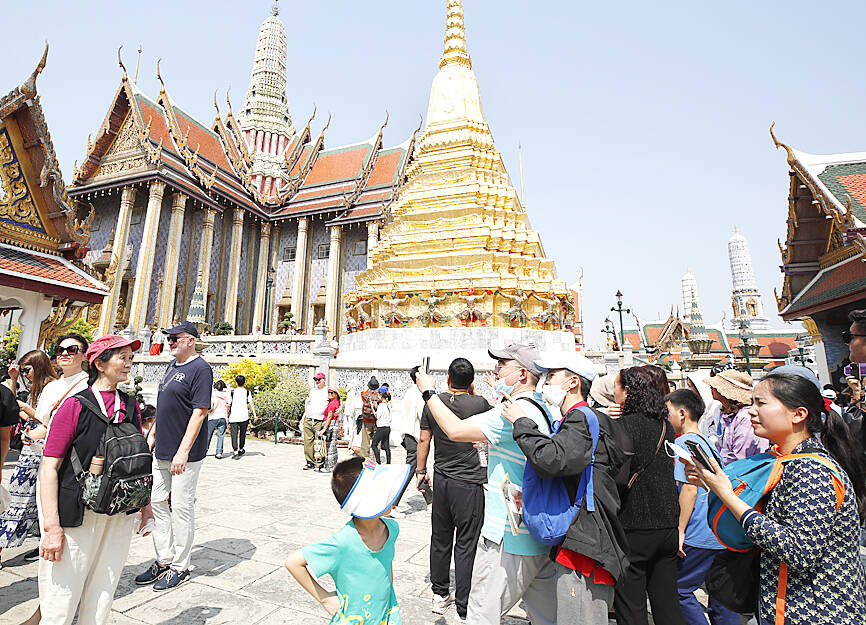Chinese engineer and aviation enthusiast Wei Ming is exactly the kind of visitor the tourism authorities in Singapore, Malaysia and Thailand are looking for.
After Singapore scrapped visas for Chinese citizens, Wei, 44, said he ditched plans to go to Australia and booked a six-day holiday there instead. He said he also looked into visiting Bangkok and Kuala Lumpur, the two other visa-free Southeast Asian countries, but decided on the city-state because of the Singapore Airshow, which opens to the public on Feb. 24.
As thousands of Chinese prepare to go abroad during the first Spring Festival holiday since Beijing lifted the COVID-19 pandemic travel restrictions last year, Singapore, Thailand and Malaysia are hoping their unprecedented visa waivers will lure a large proportion of these visitors — and their much-needed spending.

Photo: EPA-EFE
Chinese travelers often complain about the length of time and the hassle it takes for them to obtain travel visas, and their passport is 62nd on the Henley Passport Index, which ranks the passports of 199 countries according to the number of destinations their holders can access without a prior visa.
While waiving visas can make a destination more attractive, China’s slowing economic growth, job uncertainties and decline in income this year are likely to temper any outbound travel, analysts say.
“There is a feeling that the economic hardships and lack of disposable income are hitting much harder than in other parts of the world and that any travel is therefore staying within China where costs are lower,” said John Grant, chief analyst at travel data firm OAG, adding that the three Southeast Asian countries “may be looking for the trickles.”
Before the pandemic, Chinese tourists were a vital source of revenue, accounting for more than a quarter of all holiday makers to Thailand in 2019. Chinese visitors were also the top spenders in Singapore, splashing out over S$4 billion (US$3 billion) that same year.
Even though fewer Chinese are traveling than before the pandemic, Chinese account for the bulk of visitors to Thailand, which launched its visa waiver in September last year, and tourism authorities there say they expect 177,000 Chinese tourists for the Lunar New Year holiday, more than three times last year’s levels.
“The direction has been good since the visa-free program,” Tourism Authority of Thailand Deputy-Governor Chattan Kunjara Na Ayudhya said. “It’s starting to get back to pre-pandemic levels.”
Malaysia’s visa-free deal for Chinese started in December last year, and it is hoping to attract 5 million to 7 million Chinese visitors this year, which would be almost double pre-pandemic levels.
For the Lunar New Year holiday, hotels including those under The Ascott Limited group, are launching promotions such as discounts and special activities and snacks for the festival.
Because of its status as an Asian air traffic hub, Singapore is ahead of its Southeast Asian rivals in flying in Chinese visitors, with the number of direct flights connecting mainland China rising nearly 5 percent this month from the same month in 2019.
Malaysia and Thailand still have far fewer direct flights: 33 percent and 17 percent less than 2019 levels respectively, data from aviation analytics firm Cirium show.

To many, Tatu City on the outskirts of Nairobi looks like a success. The first city entirely built by a private company to be operational in east Africa, with about 25,000 people living and working there, it accounts for about two-thirds of all foreign investment in Kenya. Its low-tax status has attracted more than 100 businesses including Heineken, coffee brand Dormans, and the biggest call-center and cold-chain transport firms in the region. However, to some local politicians, Tatu City has looked more like a target for extortion. A parade of governors have demanded land worth millions of dollars in exchange

An Indonesian animated movie is smashing regional box office records and could be set for wider success as it prepares to open beyond the Southeast Asian archipelago’s silver screens. Jumbo — a film based on the adventures of main character, Don, a large orphaned Indonesian boy facing bullying at school — last month became the highest-grossing Southeast Asian animated film, raking in more than US$8 million. Released at the end of March to coincide with the Eid holidays after the Islamic fasting month of Ramadan, the movie has hit 8 million ticket sales, the third-highest in Indonesian cinema history, Film

Taiwan Semiconductor Manufacturing Co’s (TSMC, 台積電) revenue jumped 48 percent last month, underscoring how electronics firms scrambled to acquire essential components before global tariffs took effect. The main chipmaker for Apple Inc and Nvidia Corp reported monthly sales of NT$349.6 billion (US$11.6 billion). That compares with the average analysts’ estimate for a 38 percent rise in second-quarter revenue. US President Donald Trump’s trade war is prompting economists to retool GDP forecasts worldwide, casting doubt over the outlook for everything from iPhone demand to computing and datacenter construction. However, TSMC — a barometer for global tech spending given its central role in the

Alchip Technologies Ltd (世芯), an application-specific integrated circuit (ASIC) designer specializing in server chips, expects revenue to decline this year due to sagging demand for 5-nanometer artificial intelligence (AI) chips from a North America-based major customer, a company executive said yesterday. That would be the first contraction in revenue for Alchip as it has been enjoying strong revenue growth over the past few years, benefiting from cloud-service providers’ moves to reduce dependence on Nvidia Corp’s expensive AI chips by building their own AI accelerator by outsourcing chip design. The 5-nanometer chip was supposed to be a new growth engine as the lifecycle